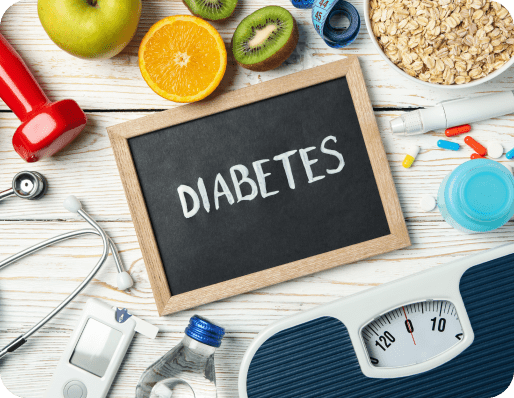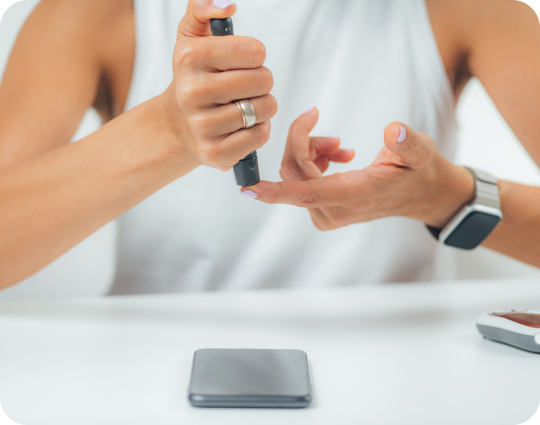What Is Type 2 Diabetes?
Type 2 diabetes is the most common form of diabetes. Most of the food we eat is turned into glucose, or sugar, for our bodies to use for energy. The pancreas, an organ that lies near the stomach, makes a hormone called insulin to help glucose get into the cells of our bodies. When you have type 2 diabetes, your body can’t use its own insulin as well as it should. This causes sugar to build up in your blood.
Type 2 diabetes is a serious condition. It can lead to health issues such as heart attack; stroke; blindness; kidney failure; or loss of toes, feet, or legs
What Is Prediabetes?
Prediabetes is a blood glucose (sugar) level that is higher than normal but not high enough to be diagnosed as diabetes. One in three American adults has prediabetes, and most do not even know they have it. If you have prediabetes and do not lose weight or do moderate physical activity, you can develop type 2 diabetes within 5 years.

Am I at Risk for Prediabetes and Type 2 Diabetes?
You are at increased risk for developing prediabetes and type 2 diabetes if you:
- Are 45 years of age or older
- Are overweight
- Have a family history of type 2 diabetes
- Are physically active fewer than three times per week
- Ever had diabetes while pregnant (gestational diabetes) or gave birth to a baby that weighed more than 9 pounds
If you think you may be at risk, a healthcare provider can do a blood test to see if you have diabetes or prediabetes.
Can I Prevent
Type 2 Diabetes?
Yes! Hearing your doctor say, “You’re at risk for type 2 diabetes,” or “You have prediabetes,” means that you can start preventing type 2 diabetes today. And you do not have to do it alone. Finding the PreventT2 program was your first step on that journey. If you have prediabetes, now is the time for prevention.
Ciba Health’s Prediabetes Prevention Program can help you take charge of your health to prevent or delay type 2 diabetes.
Get started
What is the Type 2 Diabetes
Prevention Program?
Prediabetes Prevention Program is part of the National Diabetes Prevention Program, led by the Centers for Disease Control and Prevention (CDC). It is proven to help people with prediabetes prevent or delay development of type 2 diabetes.
Successful outcomes of our prevention program
on average over a period of 12 months
-
2 ptsor greater A1C reduction
-
30 lbsweight loss on average
-
2 ptsPROMIS 10 improvement
-
78%Oura ring
sleep score improvement -
85%medication reduction
What Is the Benefit of Being Part of the Prediabetes Prevention Program?
As part of a Prediabetes Prevention Program group, you will work with other participants and a trained lifestyle coach to learn the skills you need to make lasting changes.
These changes include losing a modest amount of weight, being more physically active, and managing stress.
Being part of a group provides support from other people who are facing similar challenges and trying to make the same changes you are. Together you can celebrate successes and find ways to overcome obstacles.
Your Prediabetes Prevention Program Lifestyle Coach
Prediabetes Prevention Program lifestyle coaches have the experience and training to help you reach your goals. Your lifestyle coach will help you:
- Learn the facts about healthy eating and physical activity and explain how these behaviors will help reduce your risk for type 2 diabetes
- Set and meet your goals
- Build relationships with other participants
- Work as a group to meet challenges
What Is the Format of
the Prediabetes Prevention Program?
Prediabetes Prevention Program groups meet for a year — weekly for the first 6 months, then once or twice a month for the second 6 months to maintain healthy lifestyle changes. During each session, your lifestyle coach will teach a lesson and lead a group discussion.
Get startedFor example, you will learn to:
- Stay motivated
- Eat healthy
- Manage stress
- Add physical activity to your life
- Stay on track when eating out
- Understand and respond to your food cues
- Solve problems that can get in the way of healthy changes
Covering your care
Some insurance plans will cover the cost for Prediabetes Prevention Program. Check with your insurance provider to see if Prediabetes Prevention Program is covered.

Insurance Coverage
You may be able to get coverage from your provider for the cost of membership, lab work and prescriptions.

FSA & HSA
Many of our members use FSA/HSA to pay for membership fees, specialty tests, and supplements.

Out-of-Network Care
Your membership may be covered by your insurance provider as out-of-network medical care—many members get up to 70% reimbursed.
We working with top insurance providers
Find out if your employer or health insurance offers Ciba Health as part of your plan
Frequently asked questions
The National Diabetes Prevention Program—or National DPP—is a partnership of public and private organizations working to prevent or delay type 2 diabetes.
The partners work to make it easier for people with prediabetes or at risk for type 2 diabetes to participate in evidence-based, affordable, and high-quality lifestyle change programs to reduce their risk of type 2 diabetes and improve their overall health.
You’ll start the program by scheduling a meeting with one of our certified health coaches. After the visit, the health coach will work with you to create your personalized lifestyle optimization roadmap that caters to your needs and health concerns. Our registered dietitian will develop a customized meal plan for you to begin your 4-week energy transformation plan.
Ciba Health utilizes a multidisciplinary root-cause approach grounded in holistic and precision medicine. We take a comprehensive and personalized approach to care for each patient — studying their medical history, lifestyle, and unique biochemistry. We are using cutting-edge technology and a dedicated team of providers to equip patients with the knowledge they need to reverse chronic conditions and lead healthy lives. Each patient has a dedicated health coach, dietitian and physician who work as a team to create a personalized health plan, and make sure the patient has tools, knowledge and behavioral support to implement it.
During the first half of the program, you will learn to:
- Eat healthy without giving up all the foods you love
- Add physical activity to your life, even if you don’t think you have time
- Deal with stress
- Cope with challenges that can derail your hard work—like how to choose healthy food when eating out
- Get back on track if you stray from your plan—because everyone slips now and then
In the second half of the program, you will enhance the skills you’ve learned so you can maintain the changes you’ve made. These sessions will review key ideas such as tracking your food and physical activity, setting goals, staying motivated, and overcoming barriers. The lifestyle coach and small group will continue to support you. You may learn some new information, too.
All CDC-recognized lifestyle change programs follow a CDC-approved curriculum and discuss the same topics over the year. But, your lifestyle coach will adapt the sessions to match your group’s background, interests, and needs.
For instance, your lifestyle coach may:
- Show you how to prepare healthy versions of popular local or ethnic foods and ask for ideas from group members
- Provide tips for eating healthy during cultural holidays or events
- Share fun local events that can help you be physically active
- Give you handouts to address your specific concerns
Research shows that CDC-recognized lifestyle change program participants who lost 5-7% of their body weight and added 150 minutes of exercise per week cut their risk of developing type 2 diabetes by up to 58% (71% for people over 60 years old).
Even a decade later, program participants were one-third less likely to develop type 2 diabetes than individuals who did not join a program.
The program can also lower your risk of having a heart attack or stroke, improve your health, help you feel more energetic, and even reverse your prediabetes diagnosis.
Why a CDC-Recognized Lifestyle Change Program?
CDC supports this lifestyle change program because research shows it works. A randomized, controlled clinical trial showed that completing this lifestyle change program reduced program participants’ chances of developing type 2 diabetes by 58% compared to placebo (71% for individuals aged 60 and older), nearly twice as much as the reduction among the group taking metformin (31%).
The program focuses on life-long changes to certain habits and behaviors, which helps participants maintain healthy improvements over time. A 10-year follow-up study showed that participants were still one-third less likely to develop type 2 diabetes a decade later than individuals who took a placebo. Those who did develop type 2 diabetes delayed the onset of the disease by about 4 years.
CDC-recognized lifestyle change programs are also convenient. Nearly 2,000 organizations offer CDC-recognized lifestyle change programs, many of which are in multiple languages or are offered fully online. There is likely a convenient option for your at-risk patients in their community.
Quality Assurance
CDC only recognizes programs that use trained coaches and an approved curriculum. To help organizations, CDC developed its own research-based curriculum, which it offers to organizations at no cost. Organizations that wish to use their own curriculum must submit it for CDC review to ensure it meets quality standards.
CDC also offers technical assistance and numerous resources to help ensure program success.
Does the Prediabetes
Prevention Program Work?
The Prediabetes Prevention Program can help people with prediabetes cut their risk of developing type 2 diabetes in half. The Diabetes Prevention Program research study showed that making modest behavior changes helped participants lose 5 to 7 percent of their body weight — that is 10 to 14 pounds for a person weighing 200 pounds.
These lifestyle changes reduced the risk of developing type 2 diabetes by 58 percent in people with prediabetes.
Schedule a call with our Care Advisor today
Schedule a FREE call with one of our healthcare advisors to find out.
Schedule now